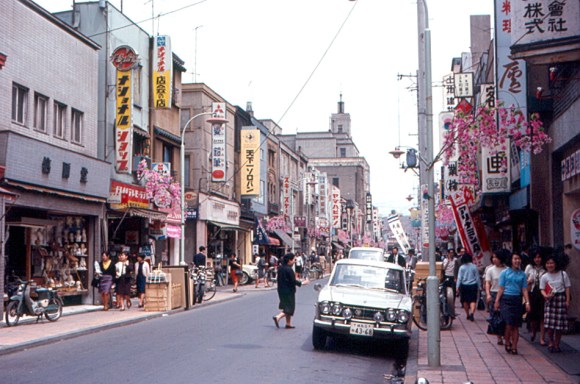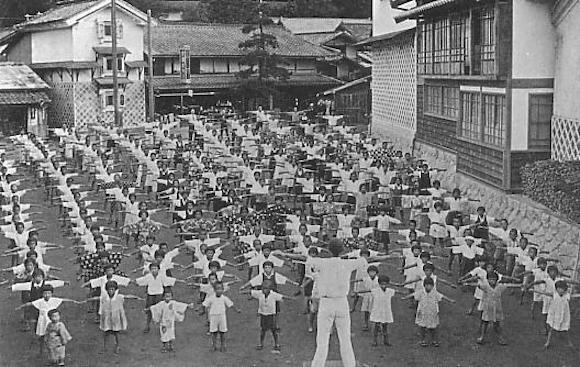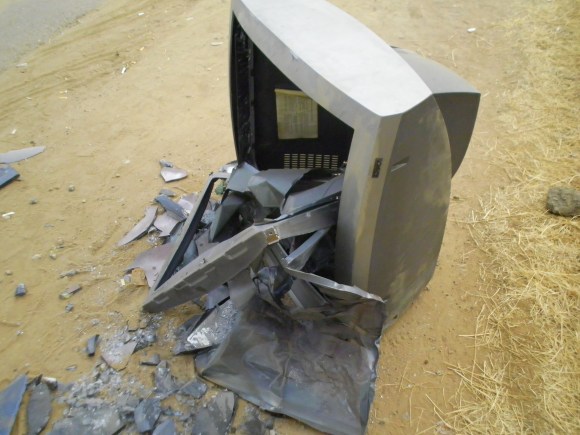
The Showa period (1926-1989) was a time of immense change for Japan when the country went from being an imperial power to a poverty-stricken post-war nation and then becoming an economic powerhouse that dominated automotive and electronic industries around the world. Twenty-seven years since that era ended and the current Heisei era began, fond memories of “Showa Japan” still flood many Japanese minds.
But a recent online poll asked netizens to take off their rose-tinted glasses and consider the aspects of daily Showa-period life that, while seeming completely normal back then, would be unthinkable now. Join us after the jump for a look at the slightly grim feedback.
The Showa period gave us some pretty fantastic art in ads and some great anime, but there were some parts of Japanese society, like corporal punishment that bordered on child abuse, that are not likely talked about when waxing poetically about the good ol’ days. Wanting to take a look at parts of life in Showa Japan that some have a tendency to forget, the online news site MyNavi Woman asked its readers to submit “overlooked Showa moments” in a recent poll.
More than 450 readers were asked, “What are the top things about the Showa era that we rarely think about?” and were able to submit multiple answers. The results of the poll, along with the percentage of respondents who submitted the answer, are as follows:
- 1. Drinking water during exercise was discouraged (28.9%)
The top answer most readers submitted was that it was considered common practice to forbid drinking water during any kind of exercise. Many net users couldn’t quite remember why this was considered good for the body at the time, but one remembered hearing their gym teachers telling them water would “thin out the blood.” Others recalled being told that drinking water during physical activities would actually cause your body to be further exhausted. Luckily, science caught up and taking water to sports practice became the norm.
▼ Tears: the only liquid allowed during gym class

- 2. Train toilets emptied right onto the tracks (22.8%)
Before modern trains came along with their fancy toilets equipped with a holding tank, it was common for train toilets to be barely more than a hole in the floor. For obvious reasons, passengers were not allowed to use the toilets while the train was standing at the station, but those living near the tracks often complained of the smell of human waste, and some even fell sick from being near open sewage. Apparently as late as 2002, there was still a train with this kind of toilet being used by JR in Hokkaido.
- 3. Everyone went to school and work on Saturday mornings (21.5%)
Forget Saturday morning cartoons, much of Japan still remembers a time when Saturday mornings were nothing more than another weekday. Children went to school and their parents went to work and the weekend didn’t truly begin until Saturday afternoon. But some actually looked back fondly at those memories because classes were often more casual and they enjoyed spending their Saturday mornings with their classmates.
- 4. The yen was about 1/3 weaker (20%)
Today, about 120 yen buys you US$1, but from 1949 to 1971 the exchange rate was fixed at 360 yen to the dollar to prop up Japanese exports. Even though Japanese industries loved being able to sell their cheap goods overseas, the weak yen made imports prohibitively expensive and trips overseas only a dream for the rich.
- 5. Need to fix the TV, just give it a whack (16.5%)
Many people who grew up in the Showa era remember when giving the TV set a good smack could improve the picture. This was because wires in the heavy CRT TVs of the past could be whacked back into place or dust that had gotten in knocked out after a good slap. Although this method of TV repair was common practice back then, we here at RocketNews24 really recommend you call your local repairman instead of going Mike Tyson on your screen.
▼ “So…is it fixed yet?”

Besides these five overlooked parts of Showa life, other readers recalled how socially acceptable smoking was, to the point that people lit up in hospital waiting rooms and subway trains needed ashtrays. And another reader remembered how pay-day during this time mean cold hard cash, making the man of the house very popular when he came home that day. How do these “forgotten” memories of Showa Japan stack up to what you know about the era?

 McDonald’s Japan goes old-school with new Showa-era Kissa Mac sweets lineup【Photos】
McDonald’s Japan goes old-school with new Showa-era Kissa Mac sweets lineup【Photos】 Japan’s most state-of-the-art vintage Showa clothing shop opens online
Japan’s most state-of-the-art vintage Showa clothing shop opens online Old Japanese photos show the awesome skill of soba delivery workers in the Showa era
Old Japanese photos show the awesome skill of soba delivery workers in the Showa era World’s first permanent Godzilla theme park ride opening at Tokyo-area amusement park
World’s first permanent Godzilla theme park ride opening at Tokyo-area amusement park Bandai releases a retro item with zodiac signs in gachapon capsule toy form…but what is it?
Bandai releases a retro item with zodiac signs in gachapon capsule toy form…but what is it? How to order snacks on a Shinkansen bullet train in Japan
How to order snacks on a Shinkansen bullet train in Japan New Pokémon ice cream, dessert drinks, and cool merch coming to Baskin-Robbins Japan【Pics】
New Pokémon ice cream, dessert drinks, and cool merch coming to Baskin-Robbins Japan【Pics】 Japan’s new difficult-to-drink-from beer glass protects your liver, but it’s a brutal experience
Japan’s new difficult-to-drink-from beer glass protects your liver, but it’s a brutal experience Demon Slayer: Kimetsu no Yaiba gets new roller coaster attractions and food at Universal Studios Japan
Demon Slayer: Kimetsu no Yaiba gets new roller coaster attractions and food at Universal Studios Japan Burger King Japan suddenly adds Dr. Pepper and Dr. Pepper floats to its menu nationwide
Burger King Japan suddenly adds Dr. Pepper and Dr. Pepper floats to its menu nationwide High-fashion Totoro cuddle purse is like an elegant stroll in the forest【Photos】
High-fashion Totoro cuddle purse is like an elegant stroll in the forest【Photos】 Hello, cosmetics! Clinique teams up with Hello Kitty this summer for first-time collaboration
Hello, cosmetics! Clinique teams up with Hello Kitty this summer for first-time collaboration To combat declining birth rate, Japan to begin offering “Breeding Visas” to foreigners
To combat declining birth rate, Japan to begin offering “Breeding Visas” to foreigners Russian crocodile hospitalized after woman falls on it
Russian crocodile hospitalized after woman falls on it Starbucks Japan welcomes alpacas for cute summer drinkware line【Photos】
Starbucks Japan welcomes alpacas for cute summer drinkware line【Photos】 Nintendo history you can feel – Super NES, N64, and GameCube controllers become capsule toys
Nintendo history you can feel – Super NES, N64, and GameCube controllers become capsule toys “The most Delicious Cup Noodle in history” – Japan’s French Cup Noodle wins our heart【Taste test】
“The most Delicious Cup Noodle in history” – Japan’s French Cup Noodle wins our heart【Taste test】 Starbucks releases a cute Frappuccino and Unicorn Cake…but not in Japan
Starbucks releases a cute Frappuccino and Unicorn Cake…but not in Japan Kyoto Tower mascot termination reveals dark side behind cute Japanese characters
Kyoto Tower mascot termination reveals dark side behind cute Japanese characters McDonald’s Japan’s Soft Twist Tower: A phantom ice cream only sold at select branches
McDonald’s Japan’s Soft Twist Tower: A phantom ice cream only sold at select branches Yabai Ramen: What makes this Japanese ramen so dangerous?
Yabai Ramen: What makes this Japanese ramen so dangerous? Finally! Nintendo Japan expands Switch 8-bit controller sales to everybody, Online member or not
Finally! Nintendo Japan expands Switch 8-bit controller sales to everybody, Online member or not Japanese government wants to build luxury resorts in all national parks for foreign tourists
Japanese government wants to build luxury resorts in all national parks for foreign tourists 10 things you should buy at 7-Eleven in Japan
10 things you should buy at 7-Eleven in Japan Studio Ghibli releases anime heroine cosplay dresses that are super comfy to wear
Studio Ghibli releases anime heroine cosplay dresses that are super comfy to wear Woman charged for driving suitcase without a license in Osaka
Woman charged for driving suitcase without a license in Osaka Studio Ghibli unveils My Neighbour Totoro miniature house model
Studio Ghibli unveils My Neighbour Totoro miniature house model Kyoto experiencing problems with foreign tourists not paying for bus fares, but not on purpose
Kyoto experiencing problems with foreign tourists not paying for bus fares, but not on purpose Fighting mild hunger with a Japanese soda that turns into jelly in the stomach【Taste test】
Fighting mild hunger with a Japanese soda that turns into jelly in the stomach【Taste test】 Studio Ghibli’s Howl’s Moving Castle tapestry unveiled in Japan for first time
Studio Ghibli’s Howl’s Moving Castle tapestry unveiled in Japan for first time McDonald’s new Happy Meals offer up cute and practical Sanrio lifestyle goods
McDonald’s new Happy Meals offer up cute and practical Sanrio lifestyle goods Sales of Japan’s most convenient train ticket/shopping payment cards suspended indefinitely
Sales of Japan’s most convenient train ticket/shopping payment cards suspended indefinitely Sold-out Studio Ghibli desktop humidifiers are back so Totoro can help you through the dry season
Sold-out Studio Ghibli desktop humidifiers are back so Totoro can help you through the dry season Japanese government to make first change to romanization spelling rules since the 1950s
Japanese government to make first change to romanization spelling rules since the 1950s Foreigner’s request for help in Tokyo makes us sad for the state of society
Foreigner’s request for help in Tokyo makes us sad for the state of society Ghibli founders Toshio Suzuki and Hayao Miyazaki contribute to Japanese whisky Totoro label design
Ghibli founders Toshio Suzuki and Hayao Miyazaki contribute to Japanese whisky Totoro label design Doraemon found buried at sea as scene from 1993 anime becomes real life【Photos】
Doraemon found buried at sea as scene from 1993 anime becomes real life【Photos】 Tokyo’s most famous Starbucks is closed
Tokyo’s most famous Starbucks is closed Princesses, fruits, and blacksmiths: Study reveals the 30 most unusual family names in Japan
Princesses, fruits, and blacksmiths: Study reveals the 30 most unusual family names in Japan We found traditional pudding perfection in a brand new Tokyo cafe
We found traditional pudding perfection in a brand new Tokyo cafe Japanese elementary school “randoseru” bag brand creates Showa-inspired line for adults
Japanese elementary school “randoseru” bag brand creates Showa-inspired line for adults Our ladylike, solo visit to the handsome butler cafe of Tokyo’s Ikebukuro neighborhood【Photos】
Our ladylike, solo visit to the handsome butler cafe of Tokyo’s Ikebukuro neighborhood【Photos】 Surprisingly simple and fast process of hand-lettering store’s name on glass awes net users
Surprisingly simple and fast process of hand-lettering store’s name on glass awes net users Two boys beaten and robbed of puffy pants, Osaka slammed for being trapped in the past
Two boys beaten and robbed of puffy pants, Osaka slammed for being trapped in the past “What’s wrong with her eyes!?” Say hello to the dentist’s doll from the (past, present) future
“What’s wrong with her eyes!?” Say hello to the dentist’s doll from the (past, present) future Nagoya City Council debates: Is toilet paper really needed in public restrooms?
Nagoya City Council debates: Is toilet paper really needed in public restrooms? Japanese squat toilet plastic model kit: Weird, gross, or both?【Photos】
Japanese squat toilet plastic model kit: Weird, gross, or both?【Photos】 Stay at a Japanese capsule hotel in Tokyo for less than US$20 a night
Stay at a Japanese capsule hotel in Tokyo for less than US$20 a night People in Japan are now stealing toilet paper in midst of coronavirus crisis
People in Japan are now stealing toilet paper in midst of coronavirus crisis Japan’s first genderless, two-piece school swimsuits are now available for adoption by schools
Japan’s first genderless, two-piece school swimsuits are now available for adoption by schools The top ten most appealing of Tokyo’s 23 special wards to live in after retirement
The top ten most appealing of Tokyo’s 23 special wards to live in after retirement Stay in a Japanese hotel room…with a train inside it!
Stay in a Japanese hotel room…with a train inside it! Awesome cardboard Darth Vader costume lets you become an eco-friendly Jedi villain【Video】
Awesome cardboard Darth Vader costume lets you become an eco-friendly Jedi villain【Video】 How to get a beef bowl breakfast in Japan for only 290 yen (some assembly required)
How to get a beef bowl breakfast in Japan for only 290 yen (some assembly required)
Leave a Reply